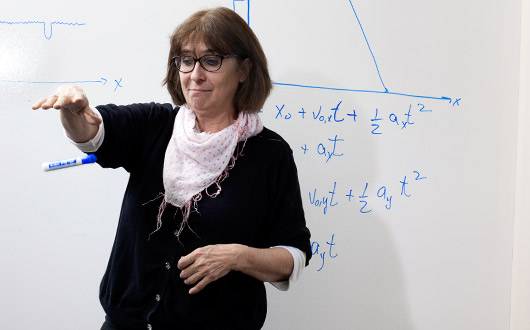The Outstanding Lecturer Award recognizes a lecturer for excellence in teaching effectiveness and service to the San Jose State campus community. This year’s winner comes from the College of Science.
She will be honored at the 15th Annual Faculty Service Recognition and Awards Luncheon on March 11, 2014. Tickets are available for purchase.
In 2008, Olenka Hubickyj had been a researcher at NASA for 25 years, studying the formation of giant planets, when she got wind that San Jose State was looking for a science professor. She had never taught before, but “the idea kept haunting me,” says Hubickyj. “So I said, ‘why not?’”
Now a lecturer in physics and astronomy, Hubickyj is this year’s recipient of the Outstanding Lecturer Award. She continues her research and serves as director of Systems Teaching Institute at NASA Ames’ University Affiliated Research Center, where she helps place students into internship research positions.
Hubickyj, who wanted to be an astronomer at age nine, knows that her zeal for science is powerful. “My kids tell me to tone down the geek,” she says, laughing. “But when I tell my students something and see their eyes … I just love it. I always tell them I want to change the course name to ‘All Things Fantastic.’”
“Dr. Hubickyj’s enthusiasm is truly contagious,” writes one of her students. “I believe that had I taken her course as an incoming freshman I would have been inspired to pursue astronomy as my major.”
Department Chair Michael Kaufman echoes this sentiment in Hubickyj’s nomination: “What is immediately evident when one walks by one of Olenka’s classrooms is the energy flowing from it.”
The child of Ukrainian immigrants who had come to New York City via a refugee camp in post-war Germany, Hubickyj can relate to many SJSU students in a way that transcends science. “I spoke a different language at home and had to straddle two cultures. I understand what it’s like for these kids who have family, cultural and academic obligations,” she says. Though accepted into a prestigious private school, she attended the City College of New York for financial reasons. “I came from a school like SJSU. If it hadn’t been for CCNY, I wouldn’t be here. Going there did not mean I was less intelligent than students at elite schools. Now it’s my turn to reinforce that message here.”
One of Hubickyj’s approaches is to allow students to express their understanding of astronomy on their own terms. A requirement of her Descriptive Astronomy course is a semester-long research project where students can present their research through any medium: she has received a symphonic poem about a mission to Mars written and performed by a music composition major, a full press packet about the Big Bang from a hospitality student, and more space art than she can fit in her office.
“To help students find their power you must respect them,” says Hubickyj. “You must give second chances and make it safe to learn.”


